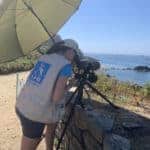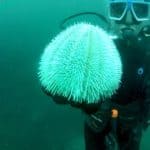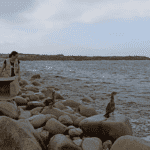Profile
Constance Schere
-
About Me:
I am a senior ornithologist specialised in seabirds. I work on a lot of different projects, mostly in offshore wind, to help mitigate the impacts of developments on seabirds and promote their conservation.
-
Read more
I completed my PhD at King’s College London in 2024, where I studied marine protected areas (MPAs) in the Irish Sea. I live in Northern Ireland, but I go home to Brittany (France) every couple of months to visit my family and take advantage of the beautiful pink granite coast. I enjoy diving, horse riding, skiing, and hiking. I also love to travel and have been to every continent except South America and Antarctica (but hope to visit soon!).
-
My pronouns are:
She/her
-
My Work:
I am a senior marine ornithologist and I work to ensure development projects don’t have a negative impact on seabird populations using the best available science and field data, and working with government bodies and nature conservation organisations.
-
My Typical Day:
There is no typical day, but I do spend a lot of time at my desk writing reports, running models, analysing data, and liaising with clients, government bodies, and nature conservation groups. Depending on the project, I may go out in the field to collect data or lead surveyor teams. Sometimes I will work on the same project for months, other times I’ll be supporting my colleagues on several different projects at once. I get to travel for work sometimes, too, mostly in Ireland, England, and Scotland – which is always a treat!
-
What I'd do with the prize money:
I’d spend the prize money on outreach to get more young people involved in marine citizen science programmes such as Seasearch UK, which allows divers (SCUBA & free divers/snorkelers) to the record species they see on their dives and contribute to a national database on marine life.
-
Education:
I have a BA in History from the University of Massachusetts Lowell in the United States and a DipHE in Biology from the Open University in Northern Ireland. I got my first MSc in Environmental Policy at SciencesPo Paris (France) and then worked as an environmental sustainability professional for a few years before going back to school to earn an MSc in Biodiversity, Conservation Planning, and Environment from the Sorbonne (University of Paris I: Panthéon-Sorbonne). I also have a PgDip in Marine Science from Heriot-Watt University in Scotland. I completed my PhD at King’s College London in Marine Conservation Biology in 2024.
-
Qualifications:
International Baccalaureate: English HL (5), History HL (5), Biology HL (4), Mathematics SL (4), Spanish SL (7), French SL (6).
-
Work History:
During my first Master’s degree, I interned at the non-profit Clean Water Action, working on ecotoxicity awareness. After my first MSc, I got a job as environmental sustainability intern at Dassault Systèmes, working in their Sustainable Innovation Lab. I then did a brief stint as a research intern at Harvard University in the Department of Environmental Health before getting my first salaried job as a sustainability specialist for Sodexo. There I worked on a number of environmental sustainability projects, in particular on sustainable seafood and marine conservation in partnership with the Gulf of Maine Research Institute. This reignited my desire to help protect the marine environment and I decided to go back to school to earn my second MSc and go on to do my PhD. I have been a marine protected area consultant for the International Institute for Environment and Development and spent several years during my PhD working as a naturalist with the French League for the Protection of Birds on an offshore marine protected area. When I submitted my PhD, I joined the APEM Group as a marine wildlife analyst, where my job involved analysing aerial survey data and marine species ID (taxonomy). Six months later, I joined the ornithology team as a marine ornithologist. I then got promoted to senior ornithologist and that’s where I am today.
-
Current Job:
Senior Ornithology Consultant
-
Employer:
GoBe Consultants, Ltd (APEM Group)
-
My Interview
-
How would you describe yourself in 3 words?
French seabird scientist
What did you want to be after you left school?
History teacher
Were you ever in trouble at school?
Define trouble?
If you weren't doing this job, what would you choose instead?
Physician (general medicine)
Who is your favourite singer or band?
Kylie Minogue or Céline Dion (singer), Westlife or the Beatles (band) - I love lots of different types of music!
What's your favourite food?
Cheese
If you had 3 wishes for yourself what would they be? - be honest!
Health, happiness, and safety.
Tell us a joke.
If you know any good jokes about fish, let minnow.
-










